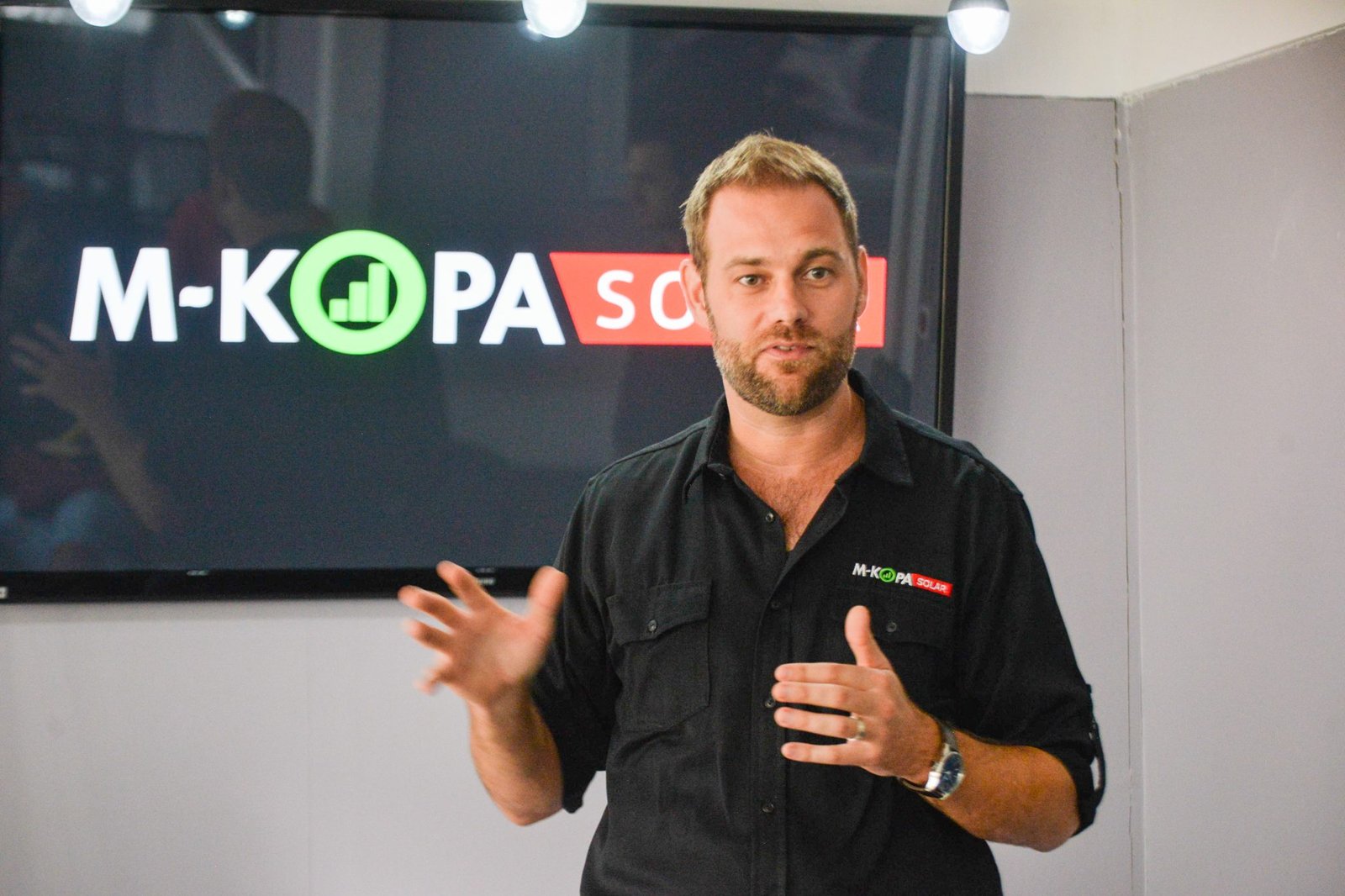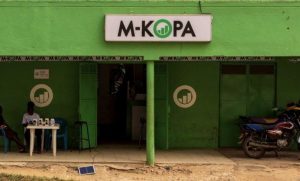Business
M-Kopa Rakes in Sh1.2 Billion as Broke Kenyans Pay Triple for Phones They Can’t Even Use
The Nairobi-based fintech giant has mastered the art of squeezing money from struggling families through its “lipa pole pole” model, a scheme that critics are now calling digital slavery.

While M-Kopa celebrates posting its first-ever profit of Sh1.2 billion and revenue hitting a staggering Sh53.7 billion, thousands of Kenyans are drowning in a sea of digital debt, paying two to three times the market value for phones that get switched off remotely if they miss a single day’s payment.
The Nairobi-based fintech giant has mastered the art of squeezing money from struggling families through its “lipa pole pole” model, a scheme that critics are now calling digital slavery.
And the numbers tell a chilling story: While M-Kopa’s executives toast to profitability after a decade of losses, ordinary Kenyans like Hussein Kingi Juma from Kawangware are coughing up Sh41,231 for a phone worth Sh17,000.
“I paid about Sh41,231 for this phone, yet if you go to the shop, it’s actually Sh17,000,” says Juma, still trying to wrap his head around how he ended up paying nearly three times the market price. “I regret it, but what can you do, brother? You scratch yourself where you can reach.”
This is the ugly underbelly of M-Kopa’s success story. Founded in 2011 to provide solar systems to low-income households, the company has morphed into a financial juggernaut that now deals in smartphones, cash loans, and insurance.
But at what cost to the very people it claims to help?
Take Oscar Nkulei, a student at the Technical University of Kenya.
He walked into a Kitui shop in February and left with a Tecno Pop 9 after paying Sh3,000 deposit. The market price? Sh12,000. The M-Kopa price? A cool Sh27,000. That’s a 125 percent markup for the privilege of paying Sh60 daily for a year.
But here’s where it gets sinister. Miss a payment, and your phone becomes a useless brick. Oscar has watched his phone get locked remotely multiple times, sometimes even after he’s already paid. Imagine trying to attend online classes or receive that urgent call from home, only to find your phone dead because you’re two days behind on payments.
“It becomes difficult for me because I can’t access the apps that are on the phone,” Nkulei explains. “Most of the time, when someone calls, they might think I’ve blocked them because they find the line busy.”
Benard Luta nearly got thrown out of a matatu when his phone suddenly locked just as he needed to pay his fare.
He had bought a Samsung A03 worth Sh15,000 for Sh34,000. When the screen started fading, M-Kopa’s response was simple: go get another phone and start paying again.
The cruelty reaches new heights with Purity Aseo’s case. She runs a small eatery in Kawangware and has been paying for a phone that was stolen 15 months ago. Why? Because M-Kopa’s system keeps sending payment reminders, and she’s terrified of being blacklisted.
“I tried to inform them about the theft, but there was no response, so I continued paying thinking I might eventually stop,” she says, her voice heavy with resignation.
While M-Kopa Managing Director Mayur Patel credits their profitability to “improved credit underwriting” and “better portfolio management,” what he doesn’t mention is the army of Kenyans trapped in exploitative payment cycles.
The company’s collaboration with Samsung and Nokia sounds impressive until you realize it’s built on the backs of people paying Sh55 to Sh113 daily for phones they’ll likely end up paying three times more for than they’re worth.
Economist Ken Gichiga doesn’t mince words. “They engage in exploitative practices that oppress people. You find that these businesses operate without regulations and therefore do not contribute to the nation’s economy.”
The pattern extends beyond phones.
In rural areas where M-Kopa first became popular for solar systems, families are returning to dangerous kerosene lamps after their paid-off solar kits mysteriously stopped working.
One parent says his children can no longer study at night because the solar lamp they finished paying for has died, and M-Kopa claims the warranty expired.
Even politicians are waking up to the scandal. Babu Owino, MP for Embakasi East, is pushing for new laws to regulate these predatory lending practices.
He argues it’s unconscionable for companies to use digital controls to punish customers who delay payments by even a single day.
The bitter irony is hard to miss.
M-Kopa secured over $250 million from investors including Generation Investment Management and British International Investment, all while its customers scrape together daily payments that amount to highway robbery. The company is being hailed as a model for sustainable fintech in Africa, but sustainable for whom?
Second-hand M-Kopa phones circulating in the market come with their own horror stories.
Unsuspecting buyers discover too late that their “new” phones are still linked to M-Kopa’s system and can lock up without warning.
Poor battery life, network problems, and substandard quality persist even as customers continue bleeding money.
Consumer rights advocates have a term for this: digital slavery. Companies use remote locks and hidden charges to control desperate customers.
The daily payments look affordable on paper, but the math is designed to trap people in unnecessary debt. A phone worth Sh12,000 balloons to Sh30,000. Solar systems fail right after final payments. And all the while, M-Kopa’s profits soar.
The company’s assembly plant in Nairobi and expansion across Kenya, Uganda, Nigeria, South Africa, and Ghana sounds like a success story. But peel back the glossy corporate reports and you’ll find thousands of Kenyans who’ve lost faith in financial systems altogether. They’ve worked hard, paid faithfully, and still ended up worse off than before.
As M-Kopa celebrates its Sh1.2 billion profit and prepares for more expansion, one question lingers in the air: Is this really progress, or just another way to extract wealth from those who can least afford it? The stories from Kawangware, Kitui, and Gatina suggest it’s the latter.
True empowerment doesn’t come from trapping people in digital debt. It doesn’t come from remote-locking phones when payments are late. And it certainly doesn’t come from charging triple the market price while calling it financial inclusion.
M-Kopa’s first profit may be cause for celebration in boardrooms and investor meetings. But for Oscar, Hussein, Benard, and Purity, it’s just another reminder that in Kenya’s new digital economy, someone is always paying the price. And it’s never the ones making the profits.
Kenya Insights allows guest blogging, if you want to be published on Kenya’s most authoritative and accurate blog, have an expose, news TIPS, story angles, human interest stories, drop us an email on [email protected] or via Telegram
-

 Grapevine2 weeks ago
Grapevine2 weeks agoAlleged Male Lover Claims His Life Is in Danger, Leaks Screenshots and Private Videos Linking SportPesa CEO Ronald Karauri
-

 Grapevine1 week ago
Grapevine1 week agoRussian Man’s Secret Sex Recordings Ignite Fury as Questions Mount Over Consent and Easy Pick-Ups in Nairobi
-

 News4 days ago
News4 days agoTHE FIRM IN THE DOCK: How Kaplan and Stratton Became the Most Scrutinised Law Firm in Kenya
-

 Investigations6 days ago
Investigations6 days agoMulti-Million Dollar Fraud: Three Kenyans Face US Extradition in Massive Cybercrime Conspiracy
-

 Economy5 days ago
Economy5 days agoIran Demands Arrest, Prosecution Of Kenya’s Cup of Joe Director Director Over Sh2.6 Billion Tea Fraud
-

 Business6 days ago
Business6 days agoA Farm in Kenya’s Rift Valley Ignites a National Reckoning With Israeli Investment
-

 Africa1 week ago
Africa1 week agoFBI Investigates Congresswoman Ilhan Omar’s Husband’s Sh3.8 Billion Businesses in Kenya, Somalia and Dubai
-

 Business2 weeks ago
Business2 weeks agoM-Gas Pursues Carbon Credit Billions as Koko Networks Wreckage Exposes Market’s Dark Underbelly


















